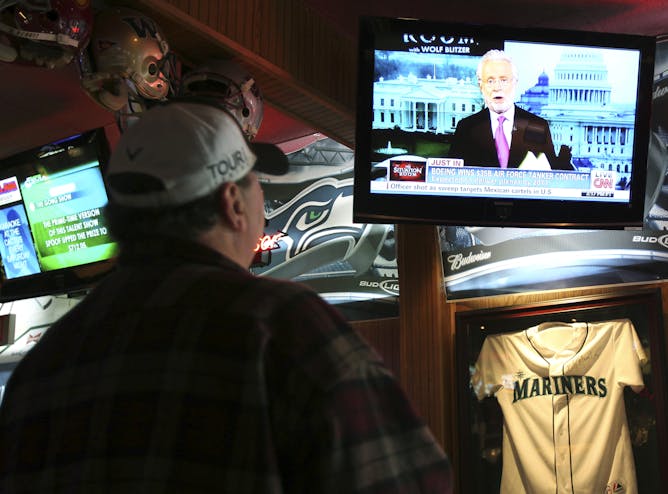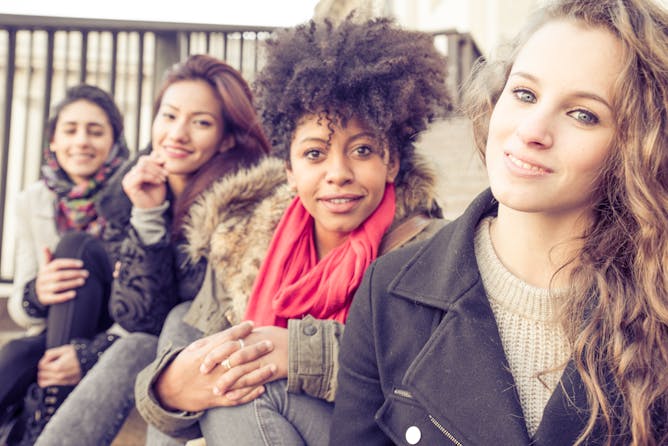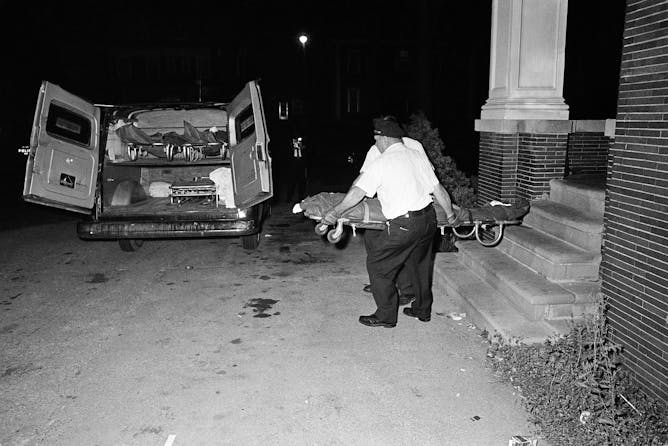Editor's note
|
|
Have you ever walked through an airport and noticed that all of the TVs are tuned to CNN? Did you ever wonder what effect this might have on other travelers? University of Florida media scholar Frank Waddell explains what happens when we watch cable news in all manner of public places: If we assume others in the room are being influenced by the network’s political slant, our own behaviors then change – whether it’s keeping
quiet, arguing for censorship, or becoming more politically active.
Some women’s colleges are attracting record levels of students – a trend spurred in part, it seems, by the #MeToo movement and the election of Donald Trump. The leaders of Bryn Mawr College, St. Catherine University and Rutgers’ Douglass College weigh in on what makes women’s colleges distinct.
And urban studies scholar Jeff Horner from Wayne State University retells the story of the Detroit uprisings of 1967, during which three black men were killed by white police at the Algiers Motel – a reminder that police brutality against blacks in the U.S. has a long history.
|
Nick Lehr
Arts + Culture Editor
|

|
|
Top stories
|

A man watches CNN at a sports bar in Everett, Wash.
Anthony Bolante/Reuters
Frank Waddell, University of Florida
If you disagree with the political slant of the network, it might color your views of others in the room – and change your behavior.
|

Enrollment in women’s colleges is up in record numbers.
oneinchpunch/www.shutterstock.com
Kimberly Wright Cassidy, Bryn Mawr; Jacquelyn Litt, Rutgers University; Jesse Gale, Bryn Mawr; ReBecca Roloff, St Catherine University
Since 2016, women's colleges have seen an uptick in enrollment. We asked the leaders of three women's colleges – Bryn Mawr, Douglass College and St Kate's – to explain the attraction.
|

Shooting victims are removed from the Algiers Motel in Detroit, July 26, 1967.
AP Photo
Jeffrey Horner, Wayne State University
Efforts to keep the city segregated led to one of the largest civil rights rebellions of the 1960s, and interactions between citizens and police turned deadly.
|
|
Today's episode of our new podcast "Heat and Light" on 1968 features Wayne State urban studies professor and Detroit native Jeffrey Horner discussing race in the North at that time – framed around the riots in Detroit over 50 years ago and the impact of the Kerner Commission Report.
    
|
Politics + Society
|
-
Jonathan Entin, Case Western Reserve University
More than two dozen states and cities are suing over a controversial new citizenship question.
-
Tricia Bacon, American University School of Public Affairs
An unprecedented onslaught from the US hasn't destroyed the terrorist organization. What is the secret of its resilience?
|
|
Health + Medicine
|
-
Rosemary Braun, Northwestern University
Everybody has a personal internal clock in their brain that dictates when we feel like eating, waking and sleeping. But what happens when our life doesn't match our body clock? And how do we read it?
-
Richard Gunderman, Indiana University
A simple act of kindness between George Bush and Michelle Obama illuminates our need for friendship and well-being.
|
|
|
|
|
|
September 11 anniversary
|
-
Dana Rose Garfin, University of California, Irvine
Even indirect exposure to the terrorist attacks of September 11 has left profound and deep impact on those too young to remember a world before that.
-
Shih-Ho Chao, University of Texas Arlington
Tragedies involving building collapses prompt structural engineers to figure out what happened, and how to prevent it from recurring.
-
Thomas Terndrup, The Ohio State University; Nicholas Kman, The Ohio State University
What we and other responders learned that day would go on to spark major changes in U.S. emergency response efforts.
|
|
From our international editions
|
-
Heather Alberro, Nottingham Trent University
Confrontation between French and British scallop fishers goes is a warning about the resource conflicts of the future.
-
Jim Davies, Carleton University
Multitasking may not be what you think it is and it might not even help you be more productive if you choose to do the wrong things at the same time.
-
Craig Bailie, Stellenbosch University
The build-up of foreign armed forces does not bode well for the citizens of Niger.
|
|
Today’s chart
|
-

 |
Steve Petsch
University of Massachusetts Amherst
|
| |
| |
| |
|
|